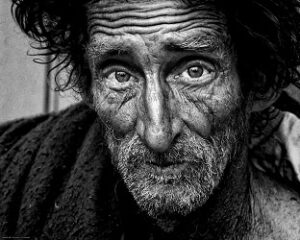 At 9:00 last night I told Jim that I was going to take a look at a documentary that was airing on our PBS station but that I thought I probably wouldn’t watch much of it, as it sounded pretty depressing. The title of the film was “The Overnighters” and was described as telling the story of a Lutheran pastor in a small North Dakota oil-boom town who opens up his church to let men sleep there who have come to find work and have nowhere else to go. Usually these films in the series “POV” are an hour long, but it was clear at 10:00 that we had a ways to go, and I was fading fast. When I turned off the TV last night I figured that I knew pretty much what was going to happen to Jay Reinke and his program; today I went online to watch the remainder and found out the rest of the story.
At 9:00 last night I told Jim that I was going to take a look at a documentary that was airing on our PBS station but that I thought I probably wouldn’t watch much of it, as it sounded pretty depressing. The title of the film was “The Overnighters” and was described as telling the story of a Lutheran pastor in a small North Dakota oil-boom town who opens up his church to let men sleep there who have come to find work and have nowhere else to go. Usually these films in the series “POV” are an hour long, but it was clear at 10:00 that we had a ways to go, and I was fading fast. When I turned off the TV last night I figured that I knew pretty much what was going to happen to Jay Reinke and his program; today I went online to watch the remainder and found out the rest of the story.
I’m not going to go into detail about the film’s ending, because I would very much encourage my readers to watch it themselves. It tells a fascinating and wrenching story, one that’s extremely relevant to the whole discussion of what truly makes us happy and what our motives for our actions should be. Ultimately, we all have to acknowledge that we are human, with human limitations, and that we can’t push ourselves so far and so hard that we have no life of our own. As the filmmaker Jesse Moss says, “No one can give that much — that much love, that much time, that much energy, that much compassion — to people outside your family, without it becoming a problem” (Buzzfeed).
If nothing else, the film gives a real human backstory to some of the men who stay in the church, reminding viewers that everyone you meet is struggling with something. If you try to help them, sure, you may end up burned. But the anguish of the man in the ripped jeans and funny hat is overwhelming, as he tries to get his wife to answer his phone calls while caressing the few photos he has of her and their children. Or the pain of the man with the weirdly-bleached hair and rambling speech, who tells the pastor that he’s never known his father because his mother was raped. What does Reinke do? Gives the man a bear hug. And then, when Todd disappears into the town’s bars, Reinke hunts him down and puts him on the bus home. “No pastor ever cared for me like you did,” Todd says. And we have to believe that he’s going in a new direction with his life. Perhaps the most tragic of the stories told in the film concerns the young curly-haired guy who gets a job on the rig and does so well that he’s given a promotion; we get to overhear the pride in his voice as he calls his girlfriend and tells her about it. She comes to town to be with him, bringing their toddler son along, and he’s thrilled. But she soon gets bored with staying alone in a trailer all day while he’s at work and returns home , taking their son with her. He misses them so much that he drives his pickup to see them, but he falls asleep at the wheel and rolls the truck. When we last see him, he’s walking with a cane, wearing a neck brace (eerily reminiscent of the one my son wore last summer), and living back home with his parents. He gamely tries to play with his son by using his cane. What will happen to him now? We don’t know.
So this is yet another one of those fine-line situations. You can’t help others if you yourself are completely drained. But the greatest source of joy we have is to give of ourselves. Where’s the limit? Lots of prayer for wisdom is needed here!